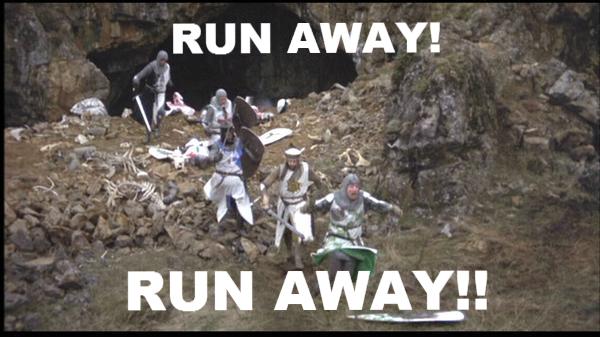Untangling Enterprise Software Development
Information, Discovery, Analysis, and Artificer
Brett Meyer
- Artificer, Project Lead
- Senior Software Engineer, Red Hat
- @brettemeyer
Typical enterprise software development...

The Problem
- Companies, teams, individuals
- Tangled mess of "stuff"
- Information, metadata, and "artifacts"
More Problems
- Re-use and prevent duplicated efforts: hard
- Understand how everything connected, related, dependent: really hard
- Minimal "breaking things" (early detection): extremely hard
Even Worse
- Same problems, but within granular content of artifacts
- Ex: XSD type declaration <-> WSDL message

Oh So Many Problems
- Tends to include a wide variety of bits
- Files, including granular content
- Files, no granular content considered
- Custom metadata for each file
- Logical, metadata-only "artifacts" (information)
Your Frustrations

(Hoping someone actually understands that reference...)
What's Needed?

Discovery & Re-Use
- Has this file/capability/project been created before?
- What pieces could I reuse?
- Who's responsible for this piece?
- How do I even find the pieces when everything is so desperate?
Impact & Dependency Analysis
- Who uses this artifact?
- How does this artifact fit into the larger picture?
- If I change this file, who's affected?
- If I change this specific element in a file, who's affected?
"Bigger Picture" Analysis
- How does this artifact fit into our projects?
- How does this artifact fit into our organization?
Hierarchical Classification
- "Tags", but more to it...
- Hierarchical ontologies
Lifecycle Management
- Thin interfaces only!
- Workflow utility
Auditing
- Show me how this artifact has changed over time
- Show me who all changed this artifact
What has worked for your organizations?

Artificer
Disclaimer

- No one likes sales pitches...so it won't be.
- General discussion of approaches, using Artificer as an example
- But it is pretty sweet...
- This is a discussion and fact finding mission!
Artificer Overview
- 100% open source project, backed by JBoss/Red Hat (Apache license)
- Formerly "Overlord S-RAMP"
- artificer.jboss.org
- @ArtificerRepo
- Nearing 1.0.0.Final
- Lots of awesome features on the roadmap
Common Data Model
- Desperate information
- Extremely varied
- Vital: normalizing into common data model
- Abstract and flexible
- Powerful and all-encompassing, OOTB
- Extendible
Common Data Model (cont'd)
- Physical and logical artifacts
- Interconnected (bi-directional)
- Hierarchical
Common Data Model (cont'd)
- "Modeled" metadata: provide the "core" data OOTB
- Auto-detection of artifact types
- Not just MIME!
- "If file 'foo' is present in the archive, it's A. Otherwise, B."
- "If the content includes 'foo', it's A. Otherwise, B."
- Ad-hoc metadata
Common Data Model (cont'd)
- "Primary": main artifact
- "Derived": logical artifacts pulled from primary content (ex: type declarations from XSD)
Derivation
- Auto creates "derived" logical artifacts from the primary
- Examples:
- Type declarations in XSDs
- Messages/ports/endpoints in WSDLs
- Many more...
OOTB Data Types
- Provide "enough" OOTB to be immediately useful
- Examples:
- Basic "document"
- XML
- XSD
- WSDL
- WS-Policy
- Java
- Office
- (Artificer also provides plugins for other types of JBoss projects)
- (Many more planned...)
Logical Data Types (Examples)
- Service information
- Teams
- Metrics
- Policies
- Deployment information
Relationships
- Bi-directional
- Between any artifacts
- Relationship name
- 1..n targets
Relationships (cont'd)
- Maybe the most important piece to get right
- Relationships between both primary and derived
- Support both automatic relationships and ad-hoc
- Auto relationship examples: WSDL imports XSD, WS doc'd by WSDL, etc.
Classifications
- Hierarchical "tags"
- "Hierarchical" == powerful, especially for queries
- Web Ontology Language (OWL)
Query Language
- Encapsulates all areas of metadata
- Can chain 0..n relationship paths
- Full text search
Smart Constraints
- Block certain actions
- Much like SQL FK constraints
- Preventing impacts > impact analysis
Extensibility
- Compile-type contracts
- Artifact "builders": derivation, custom metadata, etc.
- Artifact type detection
- Ad-hoc everything
Interfaces & Integrations
- REST/ATOM
- Web UI
- SDKs
- CLI
- Others: EJB, JMS, etc.
Visualizations
- Really hard
- Useful for impact analysis and dependencies overview
- Visualize the relationship graph
- Need to be "smart" and show enough, but not too much
Artificer Specifics
- Everything we just talked about!
- "Not Just Another Repo"
- Powerful data, powerful tooling
- Can be nearly "auto everything"
- Valuable info, relationships, context, etc. over simple repos
Artificer Specifics (cont'd)
- Maven (& Gradle): Includes a Maven Repo "Facade"
- Acts just like any other Maven repo
- Publish and consume
- Can replace your existing repo, or augment it
Artificer Specifics (cont'd)
- Performant, vertically scalable, horizontally scalable
- RDBMS + JPA (Hibernate) + Caching (Infinispan) + Indexed Search (Lucene/Hibernate Search)
- JCR (ModeShape) + Infinispan
- Planned: NoSQL + Hibernate OGM
- Maybe: Graph DBs
Artificer Specifics (cont'd)
- Mostly built on solid JBoss platforms:
- Wildfly/EAP
- Hibernate Family
- ModeShape
- Keycloak
- Errai
- Aesh
Artificer Specifics (cont'd)
- OASIS S-RAMP
- Fully-compliant with OASIS S-RAMP spec
- ...for now (fairly dead spec)
- Foundation of data model, query syntax, and REST/Atom binding
- Mostly SOA-centric
- We extend well beyond the spec
Artificer Specifics (cont'd)
- Docker (and therefore OpenShift V3)
- IDE (Eclipse) integration, coming soon
- Multiple extension point contracts, but...
- ...soon replacing with a new, powerful plugin architecture
Artificer Features & Ideas

Out of Left Field
- Software was the original purpose
- Useful in many other ways
- Any type of hierarchical, inter-connected information
Example: "Getting Things Done" (David Allen)
- Works surprisingly well
- More info: Demo GitHub README
